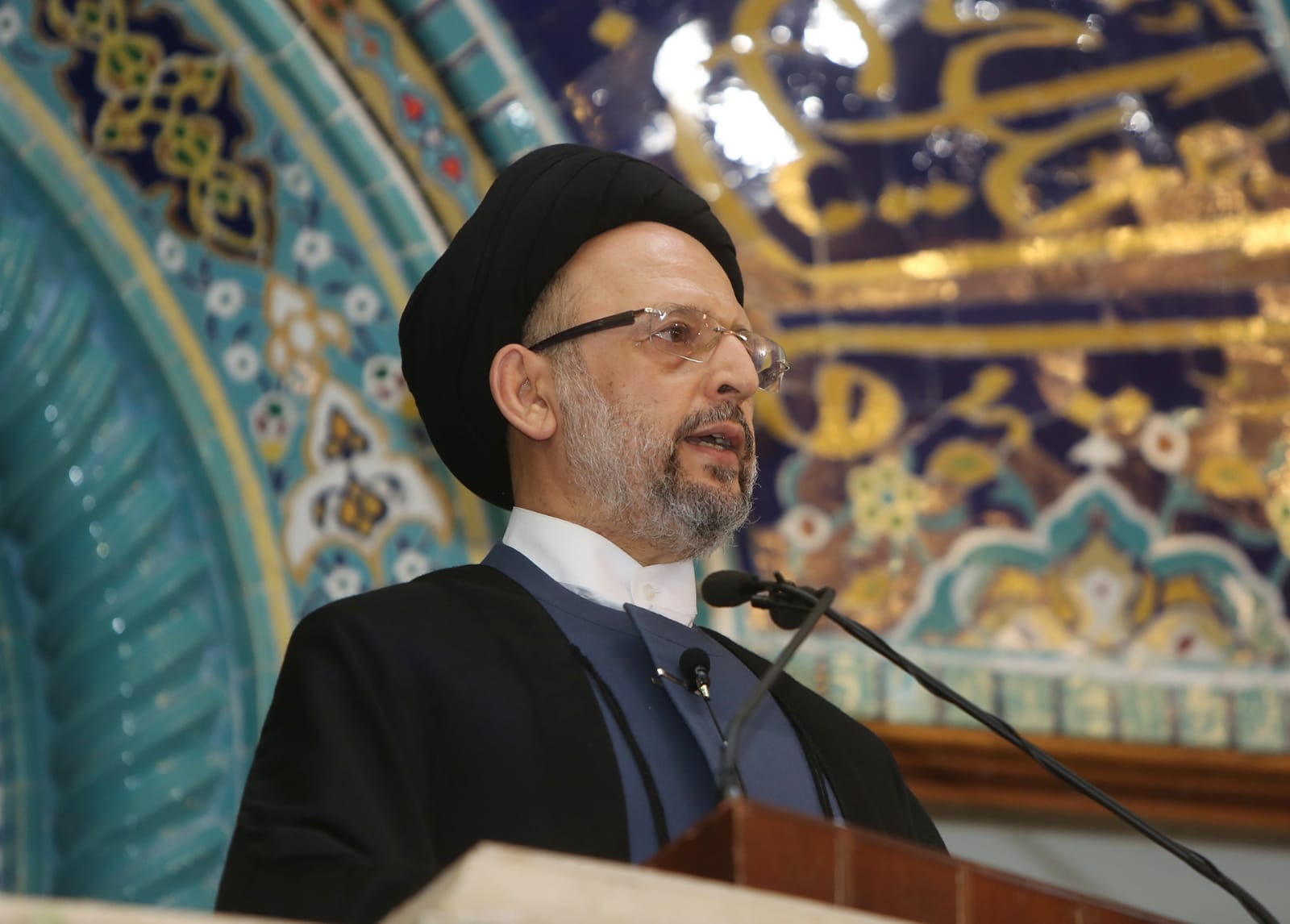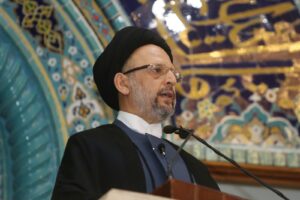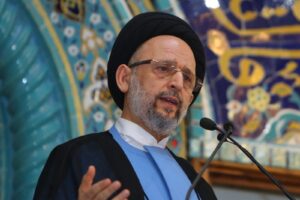The Responsibility of Speech in Times of Challenges
In the name of Allah, the Compassionate, the Merciful
His Eminence, Sayyed Ali Fadlallah, delivered the two Friday prayer sermons at the Imamain Al-Hassanain Mosque; Rabi al-Thani 18, 1447H/October 10, 2025. Several prominent religious scholars, dignitaries and hundreds of believers attended the Jumu’a prayer. Following is summary of his sermons
First Sermon
The Responsibility of Speech in Times of Challenges
Allah, the Most Exalted, says in His Glorious Book:
“And tell My servants to say that which is best. Indeed, Satan induces [dissension] among them. Indeed, Satan is ever, to mankind, a clear enemy.”
We all know today how much harm a word can cause if it goes beyond its right role, which Allah, the Most Exalted, intended it for. Words should be tools for fixing problems, spreading awareness, love, unity, and goodness among people. But often, words turn into tools for division, spreading discord, hatred, and enmity.
Just look around us and you will see the effects of careless words spoken or written without thinking about their consequences on individuals, communities, or nations. This is especially true today with the growth of media and social networks. Prophet Muhammad (p.) said:
“Many a word is sharper than a sword.”
And:
“Many a speech is sharper than arrows.
When Imam Ali (a.s.) was asked, “What is the best thing created by Allah?” he said:
“Allah, the Most Exalted, has not created anything better than the word, nor anything worse than it. By words, faces become bright, and by words, faces become dark.”
There is also a hadith that says:
“A man may say a word that pleases Allah without thinking it will reach that far; Allah writes for him His pleasure until the Day he meets Him. And a man may say a word that angers Allah without thinking it will reach that far; Allah writes for him His anger until the Day he meets Him.”
And in another narration:
“On the Day of Judgment, a servant will be raised along with the blood they have shed. A vessel filled with blood will be given to them, and they will be told, ‘This is your share of the blood of so-and-so.’ The servant will say, ‘O Lord, You know I did not spill blood.’ Allah will say, ‘Yes, but you heard such and such a story and passed it on, which led so-and-so to kill that person. This is your share of their blood.'”
Therefore, Allah, the Most Exalted, warns His servants that He is closely watching every word they say or write. He says:
“No word does he utter but there is a watcher by him ready (to record it).”
This means we must choose our words carefully, not only to avoid hurting others, but also to prevent causing fitna (discord) or tension. Allah commands:
“And tell My servants to say that which is best.”
Because Satan tries to create problems through words that divide people. The “best words” mean words full of reason and love that leave good feelings in those who hear or read them without causing any irritation. Imam al-Sadiq (a.s.) explained this verse by saying:
“Speak to people as you wish to be spoken to.”
To encourage people to speak kindly, Allah, the Most Exalted, told us its benefits in this life and the hereafter:
“O you who believe! Fear Allah and speak words that are straight (truthful and good), He will correct your deeds for you and forgive your sins. And whoever obeys Allah and His Messenger has certainly attained a great success.”
And He said:
“Have you not seen how Allah presents an example of a good word like a good tree whose root is firmly fixed and its branches (reach) the sky? It produces its fruit every season by permission of its Lord. And Allah presents examples for the people that perhaps they will be reminded.”
The good word stays, grows, and leaves a positive impact wherever it goes. But the bad word is like a bad tree uprooted from the earth, having no stability or lasting effect.
Imam Ali (a.s.) also said:
“Train your tongue to speak gently and greet others with peace; your loved ones will increase, and those who hate you will decrease.”
When someone asked the Prophet to advise him on a deed that would lead him to Paradise, the Prophet said:
“Hold your tongue except from good.”
This call to speak kindly applies not only when speaking first but also when responding to bad words. Allah, the Most Exalted, says:
“Good and evil are not equal. Repel evil with that which is better. Then the one between whom and you there was enmity will become as though he was a close friend.”
Muhammad (p.) showed this in his life. Despite all the insults, accusations, and harm he suffered, he was gentle in speech, neither harsh nor hard-hearted. Allah, the Most Exalted, says about him:
“But by the mercy of Allah, you dealt with them gently. And if you had been rude and harsh-hearted, they would have broken away from about you.”
This gentleness helped him win the hearts of people and unite them around him.
Once, after the Battle of Uhud, when his head was wounded and his close companions killed, someone told him to curse the enemies, because his prayers would be answered. He replied:
“I was not sent as a curse, but I was sent as mercy.”
Once a Jew greeted the Prophet by saying “Death to you” in disguise, but the Prophet simply replied:
“And upon you.”
His wife Aisha, got angry and cursed the man, but the Prophet (p.) told her:
“Be calm. We do not respond to evil with evil.”
“Gentleness is not found in anything but it beautifies it, and it is not removed from anything but it makes it flawed.”
“Allah is gentle and loves gentleness, and He grants for gentleness what He does not grant for harshness.”
This was not out of weakness but strength, because the Prophet was the leader in Medina at that time.
Imam Ali (a.s.) also showed this during the Battle of Siffin. When his companions started cursing the people of Sham (Syria) in response to their insults, he said:
“Stop what I have heard from you of cursing and hurting… They asked: Are we not right? And who opposes us is wrong? He said: Yes. They said: Then why did you stop us from cursing them? He said: I dislike that you become cursing people. But if you describe their deeds and mention the way they are, that is more accurate and stronger in argument. And instead of cursing them, say: ‘O Allah, stop the shedding of our blood and theirs, and make peace between us and them, and guide them from their misguidance, so they may recognize the truth from ignorance and avoid error and aggression.”
Dear beloved ones, we live in times when fitna (discord) is being stirred in our societies—religious, sectarian, political, familial, tribal, and even between nations.
We most need those who stop these conflicts, not those who ignite them; those who cool hearts, not those who fuel hatred. This can only happen with good words that bring hearts closer, strengthen unity, and remove tension and hatred from souls.
This is how we show our faith:
“Whoever believes in Allah and the Last Day, let him say good or remain silent.”
This is the guidance we are called to:
“And be guided to the good words and be guided to the path of the Praiseworthy (Allah).”
Let us pray to Allah to help us do this, and say:
“O Allah, help us with ourselves as You help the righteous with themselves. O Allah, keep us away from the traps of evil, the places of fitna, and the callers of evil. Indeed, You are the Mighty, the Wise.”
In the Name of Allah, the Most Merciful, the Most Compassionate
Second Sermon
O worshippers of Allah, I advise you and myself with the advice of the Messenger of Allah (p.). It was reported that a man came to the Prophet and said: “O Messenger of Allah, advise me.” He said: “Are you willing to take advice if I give it to you?” He said: “Yes.” The Prophet(p.) said:
“If you intend to do something, then consider its consequences. If it is wise, then go ahead. If it is misguided, then avoid it.”
The Prophet(p.) called him to think about the consequences of every action, word, or decision, and any support or rejection he might give. He should study the effects on this life and the hereafter. He should speak words that do not cause fitna or problems or tension in the family, society, or country. Most importantly, he should consider what will happen when he meets Allah, the Most Exalted, and whether he can justify his actions before Him, and whether they lead to Paradise or Hell.
If we do this, we will be wiser, make fewer mistakes, and be able to face challenges with awareness, avoiding dangers before they happen.
We remember the second anniversary of the “Tawafan (flood) of Al-Aqsa,” recalling its positive effects that we need now more than ever. It showed the strength of the resistance in Palestine and the role it plays against the enemy. Despite the continuous aggression and siege, the resistance turned from defending to attacking the enemy, shattering the myth of the invincible army within hours, causing shock among settlers about their future and the ability of their army to protect them. They felt there was no safe place left for them.
We ask strongly: If the resistance in Palestine, despite the siege and pressure, achieved this, how much more powerful would it be if all the countries surrounding this entity worked together to reclaim their occupied lands?
It (the Flood) restored respect and dignity to the Palestinian cause, putting it once again at the forefront of global events and in international institutions, after the Zionist entity had tried to marginalize it. It returned and forced itself upon the world anew. This happened because this people stood firm facing the Zionist genocide war, compelling the world to consider the rights of the Palestinian people to their land, and the necessity for them to hold their destiny in their hands. No real peace can exist without that.
This was manifested in the massive popular demonstrations that spread across many Western countries — even those that had supported the Zionist entity — calling for the granting of independence and freedom to the patient Palestinian people. A majority of the world’s nations stood to recognize their right to a state on their land. This isolated that entity in the world, shaking every major power that defends it, and pushed them to launch initiatives to find a political solution that ends this tragedy.
The recent U.S. initiative came in this context. Although it aimed to rescue this entity and lift its isolation, and to polish its ugly, distorted image, and to achieve goals it could not reach during the war — like recovering its prisoners and ending the spark of Palestinian resistance — that president, under pressure from Palestinian steadfastness and huge sacrifices, was forced in his initiative to comply with many of this people’s demands: stopping the bloodshed and destruction; preventing the forced displacement of Gaza’s residents; rebuilding what was destroyed; affirming their right to decide their fate. Yet this still requires exerting great pressure on the Zionist entity, because the enemy will strive to take from the plan only what it wants — to recover its captives — while giving nothing to the Palestinian people of their legitimate rights, whether in Gaza or in the West Bank.
At the very time when we see the importance of what could be accomplished in the first phase, we warn of the enemy’s deceptions and traps. Therefore, we call on Arab and Islamic countries — and all the free people of the world — to keep their presence active in the coming stages of implementing the agreement, to prevent the enemy from reneging on its commitments, and to help the Palestinian people take all their rights in their land and their right to self-determination.
As we remember the second anniversary of the Tawfanof Al-Aqsa, we cannot but recall the immense sacrifices made by the Lebanese people — leaders, civilians, medics and fighters — and the destruction of their cities and villages, in support of the Palestinian people and their suffering. Also, we remember what in Yemen is still being done to pressure that entity to stop its destructive war on Gaza, despite facing bombardment and assassinations.
At this moment, Lebanon still suffers from Zionist aggression — through bombings and assassinations that have struck many civilians. For example, in the Nabatieh region a blind man and his wife were targeted while on their way to fetch their children from school. Border villages are prevented from their people returning. These moves aim to increase pressure on the Lebanese state and people to make the concessions the enemy demands, whether those demands are exposed or still hidden.
Facing what is happening, and amid the continuous aggressions against the Lebanese, we renew our call on the Lebanese state to be trustworthy toward its citizens — to exert all possible efforts to stop the bleeding of blood and destruction, to prevent the enemy from going further in its crimes, and from tampering with its security. It is unfortunate to see some in positions of authority preoccupied with petty calculations or dealing lightly with matters, at a time when all efforts should be focused on stopping the aggression by every available means, not letting it pass without accountability — on the political or diplomatic level — and on rebuilding what was destroyed and securing the release of prisoners.
We repeat here our call to the Lebanese government: turn your attention to the suffering of citizens, which grows day after day in their living conditions. This is in light of burdens they now bear due to rising prices — fed by inflation from wrong financial policies — lack of oversight on prices, and increasing taxes whose effects already appear even before the budget is passed. It is time for Lebanese people to feel they live under a state that works for all of them.




